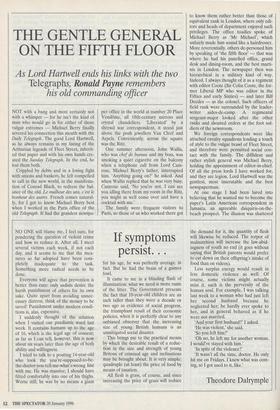If symptoms persist.. .
NO ONE will blame me, I feel sure, for pondering the question of violent crime and how to reduce it. After all, I meet several victims each week, if not each day, and it seems to me that the mea- sures so far adopted have been com- pletely inadequate to the task. Something more radical needs to be done.
Everyone will agree that prevention is better than cure: only sadists desire the harsh punishment of others for its own sake. Quite apart from avoiding unnec- essary distress, think of the money to be saved! Punishment under modern condi- tions is, alas, expensive.
I suddenly thought of the solution when I visited our paediatric ward last week. It contains humans up to the age of 16, which is the legal age of consent; as far as I can tell, however, this is now about six years later than the age of both ability and willingness.
I tried to talk to a pouting 14-year-old who took the you're-supposed-to-be- the-doctor-you-tell-me-what's-wrong line with me. He was massive; I should have fitted comfortably into one of his thighs. Worse still, he was by no means a giant for his age, he was perfectly average, in fact. But he had the brain of a guinea fowl.
It came to me in a blinding flash of illumination: what we need is more runts of the litter. The Government presents the fact that 10-year-old children are an inch taller than they were a decade or two ago as evidence of social progress, the triumphant result of their economic policies, when it is perfectly clear to any unbiased observer that the increasing size of young British humans is an unmitigated social disaster.
This brings me to the practical means by which the desirable result of a reduc- tion in the size and strength of young Britons of criminal age and inclinations may be brought about. It is very simple: quadruple (at least) the price of food by means of taxation.
All flesh is grass, of course, and since increasing the price of grass will reduce the demand for it, the quantity of flesh will likewise be reduced. The torpor of malnutrition will increase the law-abid- ingness of youth no end (it goes without saying that British parents would prefer to cut down on their offspring's intake of food than on videos).
Less surplus energy would result in less domestic violence as well. Of course, some victims might actually miss it, such is the perversity of the human soul. For example, I was talking last week to a woman who had just left her second husband because he neglected her; he hardly ever spoke to her, and in general behaved as if he were not married.
`And your first husband?' I asked.
`He was violent,' she said.
`So you left him?'
`Oh no, he left me for another woman. I would've stayed with him.'
`In spite of the violence?'
`It wasn't all the time, doctor. He only hit me on Fridays. I knew what was com- ing, so I got used to it, like.'
Theodore Dalrymple


























































 Previous page
Previous page